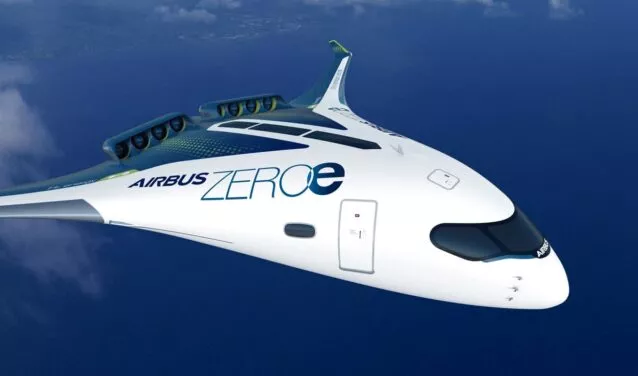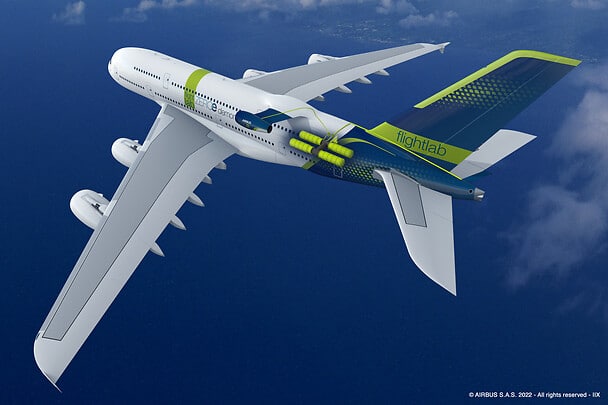
By 2050, business aviation, and aviation in general, will be aiming for carbon neutrality.
In this move towards sustainable aviation, a number of solutions are underway, such as the use of SAF biofuels, or electric aircraft models such as the Volocopter, the Alice electric aircraft or the CityAirBus.
Another alternative, however, is being planned by a number of aircraft manufacturers: hydrogen-powered aircraft.
AEROAFFAIRES presents this alternative solution for zero-emission aviation.
What is hydrogen and how is it used in aviation?
Decarbonizing the aviation sector is the aim of aircraft manufacturers between now and 2050. Hydrogen is a long-term solution that is currently being studied. But what is hydrogen? What are its advantages?
Hydrogen is one of the 2 elements that form water. It’s also the lightest element on Earth (part of the periodic table). It’s found in water bodies, lakes, oceans and even in the atmosphere.
How does it work? Hydrogen is burned in the engine’s gas turbines in combustion chambers. Then, thanks to a fuel cell, the energy released is transformed into electrical energy, which powers the engine.
Inside the aircraft, hydrogen can be stored in gaseous or liquid form at -235 degrees. As it has a lower density than today’s kerosene, aircraft structures can be modified in the future.
Last but not least, hydrogen doesn’t pollute, since the emissions it produces are nothing more than water vapor, so it’s an opportunity we can seize to achieve zero emissions by 2050.
What are the differences between green, blue and grey hydrogen?
Understanding the different types of hydrogen is essential for assessing their environmental impact. They are not all produced in the same way:
- Grey hydrogen
- Produced from natural gas or coal via a process called steam reforming.
- Emits a large amount of CO₂, making it the most polluting form.
- Blue hydrogen
- Produced using the same method as gray, but with capture and storage of the CO₂ emitted.
- Less polluting than gray, but still dependent on fossil fuels.
- Green hydrogen
- Derived from the electrolysis of water using renewable energies (solar, wind).
- Generates no direct CO₂ emissions, truly clean and sustainable.
Only green hydrogen is truly compatible with the objectives of sustainable aviation. This is the type that Airbus and other major players in the aeronautical sector are turning to.
Hydrogen-powered vs. electric aircraft: what are the differences?
Both technologies aim to decarbonize air transport, but they are based on different principles and uses. Here’s a clear comparison of the main distinctions:
Hydrogen-powered aircraft
- Uses hydrogen as an energy source (burned in an engine or transformed into electricity via a fuel cell).
- Offers medium-to-high range, particularly suited to regional and future long-haul flights.
- Fuel is recharged by filling the tanks, a faster process than recharging batteries.
- Better payload than electric, as fuel weight is less of an issue.
- Targets commercial flights, private jets and inter-regional routes.
Electric aircraft
- Powered by rechargeable electric batteries.
- Low to medium range, limited by the energy density of the batteries.
- Requires a long recharging time, which limits the frequency of rotations.
- Limited payload due to the weight of the on-board batteries.
- Mainly used for light aircraft, air cabs or short intra-city flights.
In simple terms, hydrogen-powered aircraft are better suited to long-haul operations and commercial scale-up, while electric aircraft are today reserved for short-range air mobility.
What are the current advantages and limitations of hydrogen-powered aircraft?
Advantages
- Zero direct emissions (only water vapor)
- Excellent mass energy density
- Suitable for regional and medium-haul flights
- Compatible with renewable production
Current limitations
Despite its potential, the hydrogen-powered aircraft faces major obstacles:
- Non-existent or limited global infrastructure: very few airports are equipped.
- Complex cryogenic storage: -253°C for liquid hydrogen.
- Safety: hydrogen is highly flammable, requiring very strict standards.
- High cost: specialized technology and materials are still expensive.
- Weight and volume: tanks take up more space than kerosene.
- Limited green production: most of the world’s hydrogen remains “grey”.
Hydrogen-powered aircraft offer excellent ecological potential, but many technological and logistical challenges remain.
Which countries are investing in hydrogen-powered aviation?
Many governments and manufacturers around the world are investing heavily in the development of hydrogen-powered aviation. Here are the major initiatives by country:
- 🇫🇷 France
- Airbus ZEROe program
- Development of the Beyond Aero hydrogen private jet
- Government support via the national Hydrogen Plan
- 🇩🇪 Germany
- Participation in the HY4 project
- Investments by Lufthansa Technik
- Close technological cooperation with Airbus
- 🇺🇸 United States
- Hydrogen engine projects at Pratt & Whitney
- Deployment of modular solutions by Universal Hydrogen
- Decarbonized aviation research at Boom Supersonic
- 🇯🇵 Japan
- Infrastructure development via Kawasaki Heavy Industries
- Government roadmap for hydrogen in regional aviation
- 🇬🇧 United Kingdom
- ZeroAvia’s leadership in small hydrogen-powered aircraft
- Advanced research at Rolls-Royce
- Financing regional low-emission projects
Europe, the United States and Japan are today the main drivers of hydrogen innovation in aeronautics worldwide.
Various projects for hydrogen-powered aircraft and private jets
Many aeronautical professionals are looking into this alternative to kerosene. With the goal of sustainable aviation in sight, various projects are seeing the light of day.
Recently, for example, GE Aviation and Safran joined forces with Airbus to test a hydrogen-powered engine.
And Beyond Aerospace, a Toulouse-based aerospace company founded in 2020, is planning to create a hydrogen-powered private jet after recently raising funds.
AEROAFFAIRES presents other hydrogen projects in the aeronautical sector.
1. Airbus and its ZEROe aircraft program
Airbus is currently working with several engine manufacturers to equip its aircraft. These include Pratt & Whitney, CFM International, Safran and General Electric. Airbus is gradually unveiling plans for hydrogen-powered aircraft.
Notably with its 3 different concepts called ZEROe, for zero emissions. By 2035, the aircraft manufacturer aims to have fully hydrogen-powered, CO2-neutral aircraft in the air.
Airbus is currently testing an A380. By 2025, the aircraft manufacturer will have set up a system to power one of the plane’s 4 engines with hydrogen.
For the moment, the A380 on the test bed is equipped with a 5th engine, which runs on hydrogen. 4 tanks totalling 400 kg of hydrogen are positioned close to and at the rear of the aircraft to supply the engine under test with liquid hydrogen.
According to the aircraft manufacturer, the project will “define the specifications of the hydrogen propulsion system, supervise the flight tests and provide the A380 with a test bed for testing the hydrogen engine in cruise phase”.
The 4 other engines located under the wings will continue to operate normally during the hydrogen engine test phases.

Photo Credit : Airbus
2. Pratt & Whitney and its hydrogen engine
It’s not so recent that the American engine-maker is looking into hydrogen. As far back as 1957, the company raised the possibility of creating hydrogen-powered aircraft. The American company was one of the first to exploit this sector and test the possibilities offered by hydrogen.
To date, Pratt & Whitney has revealed that it is working on a new hydrogen engine for future aircraft and private jets. The aerospace company is already working hand-in-hand with aircraft manufacturers, notably Airbus.
Airbus supplies around 35% of the engines for the Airbus A320 Neo model, as well as all the engines for the manufacturer’s A220 model. Pratt & Whitney’s idea is to build an engine capable of using liquid hydrogen, replacing the kerosene originally used.
To take things a step further, it also plans to recover the water vapour produced by the hydrogen during the combustion process. The future of “Zero Emission” is underway!
3. Partnerships to equip airports with hydrogen
Aeronautical giants are already teaming up to offer hydrogen installations at airports. This is the case with Air Liquide, Airbus and Vinci Airports, who are joining forces to evolve in this transition to sustainable aviation.
They are announcing a ten-year plan to help airports and structures to be supplied with hydrogen. The first pilot airport to benefit is Lyon-Saint Exupéry. In 2023, it will receive hydrogen gas distribution points.
Initially, the hydrogen will be used to power ground equipment such as runway vehicles and handling machines.
Thereafter, until 2030, these distribution points will be used to supply aircraft with liquid hydrogen.
AEROAFFAIRES: committed to sustainable aviation
Since 1991, AEROAFFAIRES has been helping its customers to rent private jets, with a clear ambition: to combine comfort, performance and environmental commitment.
- 100% carbon offset on every flight.
- Access to 20,000 aircraft worldwide.
- 120,000+ passengers carried with a customer satisfaction rating of 4.9/5.
Would you like to find out more about our responsible air transport solutions or book a flight? Contact us 24/7, including weekends and public holidays:
France +33 (0)1 44 09 91 82 | USA +1845 373 3456 | UK +44 84 4986 0547
Online quotation in just a few clicks.


